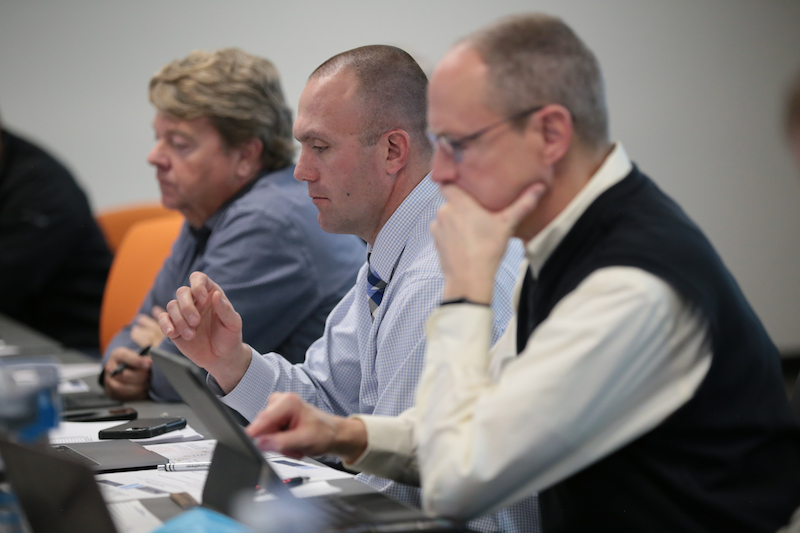
CARE Team
The Concern, Assistance, Resources, and Education (CARE) Team is a collaborative group of campus experts that provides behavioral assessments and recommends intervention strategies for students, staff, and faculty with serious needs and concerns. The team is coordinated through the ISU Division of Student Affairs, and they use NABITA (National Association for Behavioral Intervention and Threat Assessment) standards, best practices, and training tools to guide their decisions, coordinate care and determine appropriate follow-up. Generally the team meets once a week, but can be convened for additional meetings when situations demanding an immediate decision and/or University response arise.
Who is the CARE Team?
The CARE Team is made up of a core group of staff from the following University offices, but when relevant, the team may bring in others (ex: Athletics, Disability Services, Financial Aid, International Programs, Veteran Student Services, etc.):
-
Vice President for Student Affairs
-
Dean of Students
-
Public Safety
-
Counseling and Mental Health Center
-
Health Center
-
Human Resources
-
Housing
-
General Counsel
-
Title IX
-
Academic Affairs
CARE Team Frequently Asked Questions
When you submit a Report of Concern it will be reviewed by a Dean of Students staff member. Upon review of the content of the report, the staff member will determine if the case needs to be elevated to the CARE Team. Often our staff members are able to handle incoming reports on their own, connecting students to resources, reaching out to provide support, etc., so not every case needs to be addressed by the CARE Team in order to get addressed.
Part of the strength of the CARE Team is that we offer as much confidentiality as possible to the people who are reported to us. Our goal is to address immediate safety and security concerns while also encouraging use of available resources. We want to build trust with those we are seeking to help and also comply with FERPA regulations which protect student's educational records. For these reasons, we generally will not disclose details about our follow-up on the reports, however, the reporter should receive a message after completing the report to confirm it was successfully submitted. There are some rare exceptions where we may communicate back with the reporter (if they provide their contact information) to ask for more details or if there are additional concerns for safety as deemed valid by the CARE Team.
No. Currently submissions of the Report of Concern Form, which triggers the CARE Team in elevated situations, are only monitored during regular business days and hours. Someone from the Dean of Students Office will review reports submitted during non-working hours as soon as the office reopens and will engage the CARE Team where appropriate. If you are concerned about an immediate threat or the immediate well-being of someone from the ISU community, please contact Public Safety at 208-282-2515 or 911 to ensure a rapid response.
No! CARE Team reports and records are kept in a stand alone system that does not connect with student's transcripts. The CARE Team is truly a team dedicated to helping community members who are struggling to get connected to resources that will aid their success as an ISU student and/or community member. Generally speaking only the Dean of Students Office, the CARE Team, and the reporter will know a Report of Concern exists. There may be exceptions when the CARE Team may determine it is necessary and prudent to share the information with limited specific other need to know ISU staff or faculty.
No. The CARE Team is not a punitive team. They will never bring in the subject of a report to a board hearing, team meeting, or the like. The CARE Team is focused on short term planning, solutions based, and dedicated to helping our community members make meaningful connections to campus and community resources that will help them to be successful.
We appreciate as much feedback and as many details as you can provide in your report that can help us understand the situation as fully as possible. While we are happy to review your recommendations, our CARE Team is trained to determine the best interventions for those in crisis. Ultimately community members have the right to determine which resources and connections they will utilize or not. We work hard to encourage use of resources, but individuals have choice and unfortunately may not take our help.
Why do we have a CARE Team?

CARE Teams have existed on university campuses in numerous iterations for many years, and have operated under a variety of names. These groups have served as diverse and expert teams that are designated to address issues and situations of concern on their campus. The function of these teams may include threat assessment, behavioral intervention, policy development, campus community education and outreach, and more. The tragic shooting at Virginia Tech on April 16, 2007, placed a spotlight on these teams and their function. After the tragedy, a panel of experts was pulled together to conduct an independent, thorough, and objective review of the incident. Subsequent findings and recommendations included in the final report shaped CARE Teams across the nation.
While some of the findings and recommendations were specific to Virginia Tech, there were others that are general and have since been proven as best practice for universities. These include:
- Having clear policies for working with distressed and/or disruptive individuals
- Creating a centralized and accessible way for all community members to report incidents of concern
- Developing an internal system that allows designated members of a team to "connect the dots" of information for students/staff/faculty or situations of concern
- Establishing a team that is nimble, has the authority to make university level decisions, and is made up of a comprehensive group of experts
As campuses continue to respond to current events, increased issues of safety, changing state and federal policies, and individual campus needs, CARE Teams have an essential role.
